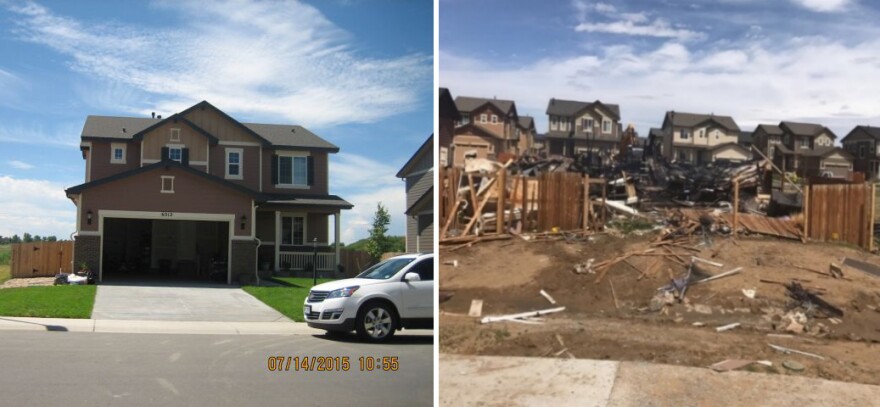This week, the Colorado Oil and Gas Conservation Commission, or COGCC, is meeting to vote on new rules to regulate flowlines in our state. This comes after the National Transportation Safety Board released their report about a 2017 home explosion in Firestone back in October.
KUNC's Colorado Edition spoke with Erin Martinez, a survivor of that explosion in Firestone, who will deliver testimony at the COGCC's meeting on Thursday.
Interview Highlights
These interview highlights have been lightly edited for length and clarity.
Erin O'Toole: You are testifying in front of the Commission on Thursday. What message are you hoping to send to the commissioners and other people there?
Erin Martinez: Honestly, from the beginning I'm just trying to make my story not become someone else's reality. And so I am advocating and pushing for change that would keep something like this from happening to someone again.
Now of course, they're considering new rules that would require things like mapping of flowlines, more testing of existing lines, and requirements for what to do when abandoning those lines. What do you think about the proposed rules. Are they enough?
I think there were several circumstances that led to my home explosion, and I would really like to see a bunch of rules and regulations put in place that would keep something like that from happening again.
Specifically, the line that leaked gas into our basement was not properly abandoned. It was left connected to the well, and so I'm really pushing for things that are going to be left in the ground, such as abandoned pipelines or flowlines, for them to be removed. When they're removed, it's pretty hard for them to be a conduit of gas to travel through them, and an explosion can occur.
I'm also pushing for disclosure. I think that the public should be allowed to know what is in and around where they're purchasing their homes, or where they're working, where they are sending their kids to school. Specifically, flowline information has never been shared with the public and we had a flowline that was six feet from the perimeter our house, and that is something we should have known about.
Also pushing for inspections. I feel like when wells change ownership between companies, there should be an inspection done in order for you to know what you're now liable for. Had there had been an inspection in the five times that that well changed hands behind our house, someone would have found that that flowline was still connected to the well, and I wouldn't be here telling you my story right now.
And, finally, I'm just really pushing for when a well has been a shuttered well and has been reactivated, that notice be sent to the people around the well, and in addition, they do some sort of inspection, and pressure checking before they put that well back online.
 Aerial view of Anadarko production field from late 2015 with illustration of the pipelines and the Coors V6-14Ji well location.
Aerial view of Anadarko production field from late 2015 with illustration of the pipelines and the Coors V6-14Ji well location.
Credit National Transportation Safety Board
It's taken a little while to get to this point, more than two years for these rules to be considered by the COGCC. What are your thoughts on why it has taken this long?
It's a frustrating process. Obviously when the explosion happened and we discovered the reasons for why it happened, you want things to be changed immediately. And there were some additions to the flowline rules that were made, there were some changes to the 8-1-1, but there really wasn't any concrete things that were done in order to prevent something like this from happening.
And (Senate Bill) 181 was passed and it opened up the door to be able to make these changes and write these regulations, and as much as I would have loved for it to happen immediately, I'm just thankful that we are finally in a position where we can make these changes and that we can try to prevent something like this from happening again.
I wanted to ask you about advocacy as a part of your life now. You have said that you didn't ask for this role, and you also say that you're not out to ban fracking or destroy an industry. What would you like people to know about your involvement?
I'm not out to try to destroy oil and gas. I'm not trying to promote that it doesn't happen in Colorado anymore. I realize that it's a big part of our daily lives and our economy, and I think that oil and gas can continue to do what they're doing in Colorado. I just think that they need to be held accountable for their actions, and I think that we all need to make sure that if it's going to be in and around where we are going to all live that it's safe. And I think that there's a lot of regulations and things that need to be done for that to happen.
And, I mean yeah, I definitely never wanted this role, but I really feel that I know what it's been like for the last two and a half years for my family and I, and I would never want to see another family to have to go through this, and I think the best way to honor the memory of my husband Mark and my brother Joey, is for something good to come out of this, and that good can be this change, and that we can make everyone in and around oil and gas safe, and we can prevent something like this from happening again.
This conversation is part of KUNC's Colorado Edition for Nov. 20. Listen to the full episode here.





